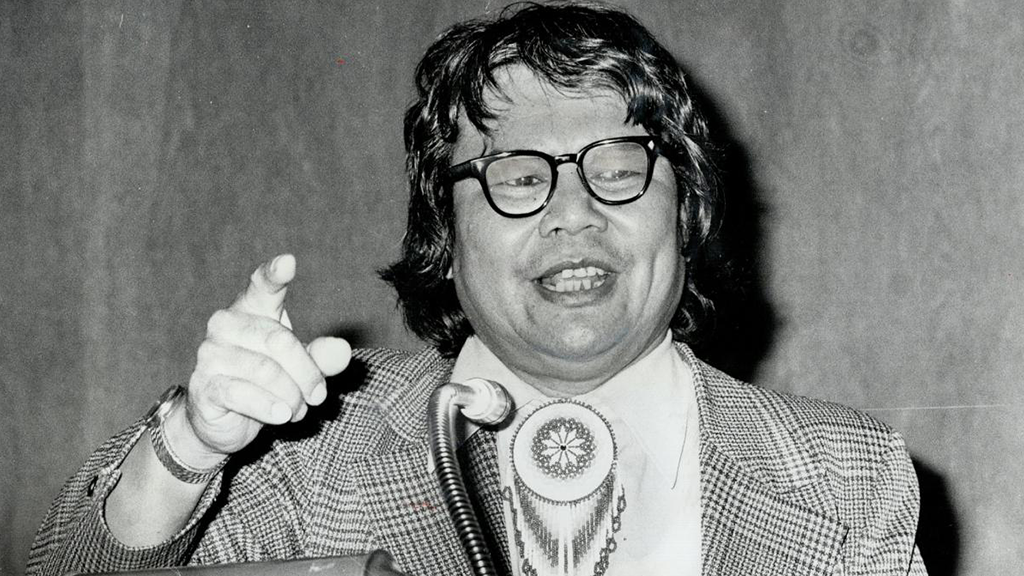


Grand Chief George Manuel is a Leader above all Leaders. He led with courage, “without fear, and only favor” for Fourth World Peoples. George is reminding us ceaselessly that all cultures and futures of our peoples are dependent on our ancestral lands given by the creator. For countries invading and forcibly taking control of these ancestral lands, there was nothing but a sense of urgency in George’s mind and manner to reclaim the life-giving lands of our ancestors.
The right to land was uppermost in George’s thinking. In his way of thinking, without securing and maintaining the right to life-giving land, the people would starve, and they would die. In George’s words, as we talked about the development of the World Council of Indigenous Peoples, “We must take back our lands. That is the fullest expression of our right.”
He told the story of his encounter with Tanzania’s first Prime Minister, Julius Nyerere. George was the National Indian Brotherhood leader and was asked by Canada to travel with the Canadian delegation to Tanzania. Arriving in Tanzania’s capital in 1971, the young Prime Minister greeted George as if he was the lead diplomat from Canada. George said, “No, the representative of Canada couldn’t make it.” Nyerere said, “Then you will come as my guest for dinner, and we will get to know each other.” George was treated with a “state” welcome and a splendid meal at dinner. George decided to seize the political moment, and he turned to Nyerere and said, “I want you to help my people regain control over our lands in Canada!” Nyerere asked George, “What will you give me if I help your people reclaim their land?”
“What?” George exclaimed!
“You are the chief of your people, and I am chief of mine. You should know how important it is that as the Prime Minister of Tanzania, you now have the power to help us reclaim our land. We have nothing!”
Nyerere replied, “You must know I must get something in return for taking the risk of sticking my neck out for helping you.”
“Why, you son of a bitch,” George said as he practically yelled.
“If the land is yours, then you must take it back yourself,” Nyerere explained.
For George, this proved to be a guiding commandment for his political leadership to the end of his days. “We can’t ask for help. We must help ourselves,” George would say over and over again before the National Indian Brotherhood, the World Council of Indigenous Peoples, the Union of British Columbia Indian Chiefs, or his own band, the Neskonlith or the United Nations.
Chief Manuel worked to take the initiative and encourage other nations to take the lead to “help themselves.” He had met with the Hopi in the United States and learned about their origin story and how they said they are the people of the “Fourth World.” The Hopi described the three worlds that had to be destroyed because the people did not live by the laws of Mother Earth, but the Hopi had arrived in the Fourth World that they would call the “world complete.” George carried that story with him, traveling to New Zealand to meet with the Māori, then to Australia to meet with Aboriginal leaders, and to Scandinavia, where he met with the Sami. He told the Hopi story and discovered that other peoples he visited had similar origin stories. He realized that these peoples he met, and the many more he met in South America, Africa, and the United States, shared similar origin stories, and they all knew about the four directions. George decided the peoples he led in Canada and would soon lead in the World Council of Indigenous Peoples were all peoples of the Fourth World.
Grand Chief George Manuel’s legacy echoes throughout the world among Fourth World Peoples to this day, seeking to take back their ancestral lands and to live in peace in the face of widespread invasions of their territories. Chief Manuel would be proud of the new young leaders in West Asia, Africa, Asia, South America, South Pacific, and North America stepping forward to uncompromisingly reclaim their heritage, their cultures, and their lands.
Chief Manuel co-founded the Center for World Indigenous Studies with me 40 years ago, and we celebrate him through the Grand Chief George Manuel Memorial Library. His work continues as CWIS supports Fourth World nations globally through research, education, and public policy. Indeed, we have provided technical assistance to Fourth World nations in Africa, West Asia, South America, Asia, Europe, and North America as they help themselves. We are in the middle of establishing the Nations International Criminal Tribunal, and George would be very proud of this. We are working with Fourth World nations to hold accountable individuals and countries that commit crimes of aggression on ancestral lands, culturcide, and genocide against Fourth World peoples. The Nations International Criminal Tribunal is expected to hear its first Fourth World nation cases in 2026. Work is underway to engage Fourth World nations’ governments and selected states’ government to invite their signature or ratification of the Tribunal’s Charter.
He would say, “Take back what is yours.” I am proud to have known and traveled alongside my Elder Brother, Grand Chief George Manuel.
The library is dedicated to the memory of Secwepemc Chief George Manuel (1921-1989), to the nations of the Fourth World and to the elders and generations to come.
access here